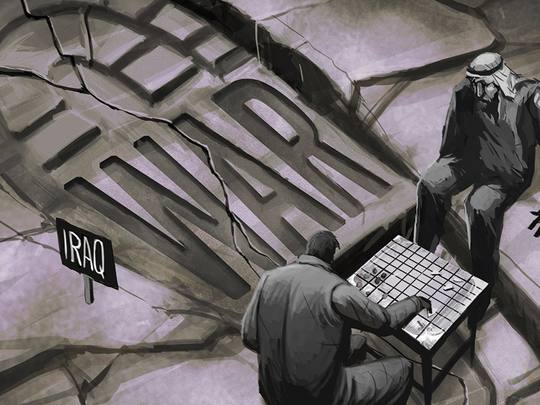
How should war-weary, crisis-ridden Iraq go about positioning itself, now with time on its hands, after routing the destructive forces of Daesh (the self-proclaimed Islamic State of Iraq and the Levant) and handling the secessionist ambitions of Iraqi Kurds?
Given its “long-term potential”, as a report by the United States State Department’s Bureau of Economic and Business Affairs released on June 29 put it, Iraq’s prospects look good, provided the country “reforms its failing state-owned enterprises, fights corruption, reduces bureaucratic bottlenecks and invests in necessary infrastructure”.
But that’s only the economic side of the coin. A country that suffers grievously under the weight of sectarian divisions, as Iraq sadly does at this time in its history, must also find a way to reconcile this “potential” for economic prosperity with the human needs of its heterogeneous population. Man, as the old adage has it, does not live by bread alone. Eradicating these divisions, I say, is indispensable to the achievement of a pluralistic society where Iraqi Sunnis, Iraqi Shiites and Iraqi Kurds, along with sundry other Iraqi minorities, coexist in cordial tolerance of each others’ differences. Without that, there is no stable Iraq. As simple as that.
Call a multi-cultural, multi-ethnic, multi-confessional society, as Americans call theirs, a “melting pot” — or call it, as do Canadians, especially those who live in bilingual Quebec — a “cultural mosaic”. Or, better still, call it what Timothy Egan, the New York Times columnist, called it on the Op-Ed page last Saturday as, “the American experiment”, which he identified as “the audacious idea that people from all races, ideologies and religious sects would check their hatreds at the door [when living as citizens of the US]. Within America’s borders, Protestants don’t fight Catholics, Sunnis don’t go after Shiiites, Armenians share neighbourhoods with Turks, and a family that can trace much of its ancestry to slavery occupies a White House built in part by slaves”.
Let’s face it. The challenges confronting Iraqi leaders today — of rebuilding their nation and turning it into not just an economically prosperous one, but also one with a cohesive polity — are daunting. Iraqi Kurds, whose dream of secession was left in tatters after the referendum in September, are seething with resentment; Iraqi Sunnis, with 2.5 million of them displaced, have seen their towns destroyed by coalition bombings and militia artillery, and their children traumatised by living under Daesh (the self-proclaimed Islamic State of Iraq and the Levant) rule, where, instead of attending schools, they were made to attend executions; and members of the Shiite community, who went from minority role to majority rule, today find that uneasy lies the head that wears a crown.
All well and good to write about the melting pot, the cultural mosaic and “the American experiment”, but Iraq is not US or Canada. Iraqis have a different sense of communal reference. Thus the trajectory of their social formation could not be identical to that of any other country, let alone countries in North America.
What Iraqis have to draw on is their unique past, whose images are imprinted on their sensibility much in the manner of genetic information, and by whose echoes they determine the reach of their own voice in the present. There was a time — and not in the distant past either — when they lived peacefully together in the same integrated neighbourhoods, when they intermarried, when they fought together against colonial rule, when being Iraqi was the identity that had a leading positional value in their self-definitions.
Difficult to imagine that today but, yes, there was a time when there existed a deep concordance between Iraqis and the natural setting of their social life — even in the midst of repressive and vulgar governance — and wide recognition of the civilising role of the arts, the sciences and high culture (recall the Arab maxim from the 1950s, “Beirut writes, Cairo publishes and Baghdad reads”) and the equally widespread belief in the virtues of pluralism, where different people, with different interests, different convictions and different lifestyles freely spoke their minds to each other without coming to blows.
Please agree with me that to this day, Iraqis still carry within them bits and pieces of that complex national archetype.
Iraq, however, once a great garden of civility, is today ravaged and in need of assuring its minorities who are now at the periphery that soon they will be given reason to have faith in the centre — assuring them that no adherents of a given sect, who believe that the realisation of their dreams, or the success of their objectives, requires the marginalisation or the purging of other sects, will have a place to hide or authority to rule in the new Iraq.
Iraq’s future, I say, is of paramount significance to the Arab world just as it is to the rest of the world: The former for politico-cultural reasons, and the latter for geopolitical ones.
Alas, as we speak, Iraqis remain a divided people, inhabiting a divided society. If this is who Iraqis are, is it who Iraqis want to be? This a question that only Iraqis can provide us with an answer.
Fawaz Turki is a journalist, lecturer and author based in Washington. He is the author of The Disinherited: Journal of a Palestinian Exile.









